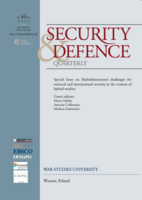Russian disinformation in Moldova and Poland in the context of the Russo-Ukrainian war
Russian disinformation in Moldova and Poland in the context of the Russo-Ukrainian war
Author(s): Marlena Zadorożna, Marin ButucSubject(s): Media studies, Security and defense, Russian Aggression against Ukraine
Published by: Akademia Sztuki Wojennej
Keywords: disinformation; strategic communication; information warfare; fake news; the Russo-Ukrainian war;
Summary/Abstract: Russian disinformation carried out as part of the ongoing war in Ukraine is becoming a challenge for neighbouring countries that border the conflict region. The aim of the analysis was to identify common features between Russian disinformation in Moldova and Poland, which, as two of the countries that border Ukraine, were on a list of Russia’s main targets for disinformation in 2022. The geopolitical and historical importance of both countries increases their social polarisation. The study was therefore guided by the following research question: What common features can be distinguished between Russian disinformation in Moldova and Poland? The research took the form of an open comparison. According to the approach used, the empirical cases used for comparison were not explicitly limited a priori. In order to carry out the research, however, preliminary assumptions were adopted that ensured temporal, conceptual, and interpretative comparability of the data. Research results proved that Russian disinformation in both countries is based on the following common features: creating internal divisions, propagation of distrust towards the West, stimulating social emotions, use of social media, and popularising pro-Russian narratives. Analysing these areas may be helpful in increasing the ability of states to detect and disclose disinformation. Scientific publications describing Russian disinformation focus on the national perspective, which does not always correspond to the transnational nature of disinformation campaigns. Meanwhile, this article synthesises knowledge about disinformation mechanisms occurring in two countries bordering the conflict region and draws attention to the need for research in this area.
Journal: Security and Defence Quarterly
- Issue Year: 46/2024
- Issue No: 2
- Page Range: 47-65
- Page Count: 19
- Language: English

